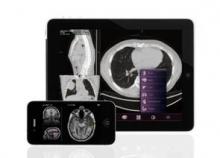The Food and Drug Administration could soon sharpen the regulatory line separating mobile applications meant for medical decision-making from more patient-oriented apps.
Currently, there’s a fuzzy line between apps that physicians directly use in practice and those meant to encourage changes in patient behaviors, experts said this week at a Capitol Hill briefing sponsored by the Alliance for Health Reform.
The FDA issued proposed guidelines in July 2011 outlining its plans to regulate medical applications, and even smart phones, as medical devices. The FDA won’t unveil its final guidelines until later this year, but stakeholders are weighing in now on where the line should fall.
"Information that doesn’t look like health care information in one context is in fact relevant to your health in other contexts," said Deven McGraw, director of the Health Privacy Project at the Center for Democracy and Technology. "I don’t know that I want to say, ‘FDA, go away,’ [regarding] some of these apps that in fact are designed to be used to make medically relevant decisions."
For Ms. McGraw, the distinguishing factor will be whether a flaw in the application could lead to a flawed diagnosis or treatment regimen.
The Department of Health and Human Services is considering creating incentives such as increased reimbursement for doctors who adopt medical applications that are proven to improve outcomes, said Joy Pritts, chief privacy officer at the HHS Office of the National Coordinator. She was unclear, however, when or how that would happen.
Although mobile applications hold great promise for improving health outcomes, Dr. Christopher Notte said that he’s wary of the FDA stepping in.
"Physicians are very excited about mobile technology, and about ways that they can employ it to care for patients in settings where they otherwise wouldn’t have access," he said in an interview. "I’m only skeptical of more federal regulation, even veiled as an incentive program.
"Sometimes what begins as an incentive ultimately ends up as a requirement," cautioned Dr. Notte, a clinical informaticist at Abington (Pa.) Memorial Hospital and a partner in EHR Practice Consultants. An incentive program could be a slippery slope toward meaningful use requirements, which aren’t determined in any meaningful way for physicians, he added.
The blurry lines matter to more than just the apps’ physician users. App developers, too, must decipher whether or not an app would require FDA regulation. That’s why clear definitions will be crucial for a community that isn’t used to dealing with FDA approvals, said Stephen Downs, chief technology and information officer at the Robert Wood Johnson Foundation.
"What you hear in the developer community is that the most important thing is, however [the lines] are drawn, they’re drawn and they’re clear," Mr. Downs said at the briefing. He added that FDA regulation should be determined by how the information is used.
"It’s less about the data collected – maybe even less about the analysis of the data – but more about any recommendations for action," Mr. Downs said.
The FDA is narrowing the scope of which applications they’ll take on, said FDA spokesperson Erica Jefferson. Specifically, mobile applications that give smart phones the same abilities as a medical device will fall under FDA regulations, she said in an interview. For example, in February 2011, the agency cleared an application that allows physicians to view radiology images on their iPod or iPad.
The FDA is still finalizing the regulations, but the agency will hold a teleconference Aug. 30 to discuss what applications should be regulated.
–Frances Correa (@FMCReporting)


